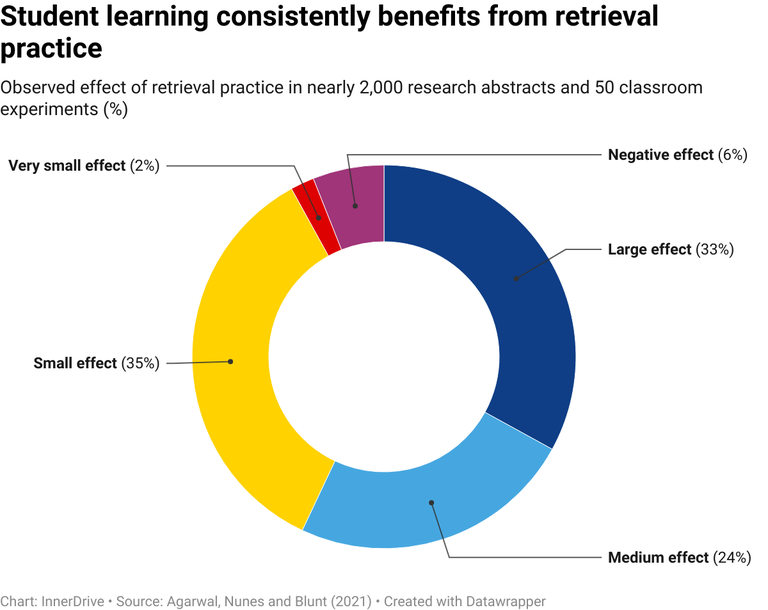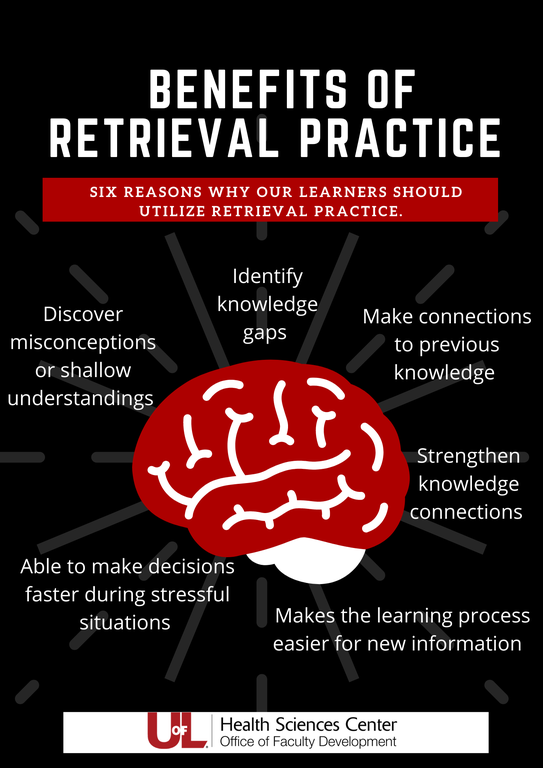Retrieval is Golden

If you have heard me speak, I always refer to my favorite cognitive scientist, Dr. Pooja Agarwal. Dr. Agarwal is known for her research on retrieval practice and her website retrievalpractice.org. She and colleagues have recently published a review article on the benefits of retrieval practice for learners. As a reminder, the definition of retrieval practice is when the learner actively attempts to recall or recognize and then reconstruct their memory of knowledge during the learning process.Their review article considered almost two-thousand papers that looked at the benefits of retrieval practice in different educational settings, including nursing and medical education.
What did the researchers find?
The graphic below indicatesthat a majority of the studies show benefits with medium or large effect sizes from retrieval practice.

We know retrieval practice is beneficial to our learners. So, the real question is: how can we convince our students, residents, and fellows to use these strategies to enhance their learning? We need to let them know the “why” and to understand the “how.”Let’s concentrate on six reasons why our learners should utilize retrieval practice.
Identify knowledge gaps – You have probably heard the phrase,they don’t know what they don’t know. We all have gaps in our knowledge, but we must know they exist to fill the gaps. When learners use active retrieval strategies, they can identifyspecific missing content. Once that knowledge gap is identified, the learner can work tofill in the missing information. To be successful, the learner would need to re-evaluate this area with additional retrieval to make sure they have adequately mastered this content.
Discover misconceptions or shallow understandings – Years ago educators produced the Private Universe video series, which showed ivy league graduates incorrectly explaining phenomena such as how the Earth has seasons or the makeup of wood from a tree. This may seem surprising, since this is content every elementary or middle school student learns.Why,thenwere thesequestions difficult for the graduates to answer? The answer is simple: they have held on to a misconception about a specific situation or idea for an extended time, and nothing they learned during their education contradicted their misconception or shallow understanding. Luckily, active retrieval practice can help learners see theirmisconceptions that they still hold on to. Correcting misconceptions is similar toidentifying and filling a knowledge gap, but the learners do not think they have a gap in this situation. Active retrieval strategies can help to point out misconceptions to a learner.
Make connections to previous knowledge – Expending active cognitive effort on a task results in better performance. Retrieval practice is an active process, requiring lots of cognitive effort. Therefore, learners who engage with retrieval practice strategies are thinking harder about the information they have to remember while making inferences and connections with previouslylearned information. As a result, this process helps to consolidate and bring together a wide range of academic knowledge, resulting in improved academic performance.
Strengthen knowledge connections – It is not enough for students to have previously made connections within their schema, or how content is organized in the learners’ brain. Unfortunately, we all forget far more than we would like, with this rate of forgetting being quite steep.3 Therefore, one round of retrieval practice isn’t enough. We must repeat this process regularly to entrench and cement it.Using different retrieval strategies to revise the same content repeatedly strengthens the connections between new information and previouslylearned information.
Make better decisions during stressful situations–Stress can impact our thinking like kryptonite affects Superman.When stressed, our focus becomes very narrow, making it hard for a learner to problem-solve using critical thinkingor to consider a full list of differential diagnoses.Active retrieval practiceenhances theconnectivity of neural pathways (probably more myelination) to their existingknowledge and understanding,improving their ability to process decision-making effectively in stressful clinical environments.Students who useretrieval practice feel less anxious and aremore likely to recall critical information in situations of intense pressure.
Make learning easier for new information – Consider this one the bonus benefit of retrieval practice. Know the old saying;the rich get richer? The same sentiment is true for knowledge and memory. The more you know, the easier it is to learn new information, as you have more existing anchor points to hook new information.Retrieval practice is one of the most effective and efficient ways to learn things, it provides a firm foundation for future learning.

Final thoughts – The “whys”aboveneed to be articulated to learners toexplain the benefits provided by retrieval practice.Retrieval practice is a highly researched and effective strategy to help learnersacquire new information. Overall, retrieval practice makes learning more efficient and durable. Our learners have so much content they need to know;—why would we want them to use ineffective study techniques and waste precious time?
Be sure to see the next post where I discuss howto use active retrieval appropriately to get the most out of the time our learners devote to studying.
If you are interested in learning directly from Dr. Agarwalcheck out this 3 minute video of her discussing retrieval practice.
Citations:
- Agarwal PK, Nunes LD, Blunt JR. Retrieval Practice Consistently Benefits Student Learning: a Systematic Review of Applied Research in Schools and Classrooms. Educational Psychology Review. 2021;33(4):1409-1453.
- Kuldas S, Satyen L. Greater Cognitive Effort for Better Learning: Tailoring an Instructional Design for Learners with Different Levels of Knowledge and Motivation. Psychologica Belgica. 2014;54(4):350-373.
- Murre JMJ, Dros J. Replication and Analysis of Ebbinghaus’ Forgetting Curve. PLOS ONE. 2015;10(7):e0120644.
- Agarwal PK, D’Antonio L, Roediger HL, McDermott KB, McDaniel MA. Classroom-based programs of retrieval practice reduce middle school and high school students’ test anxiety. Journal of Applied Research in Memory and Cognition. 2014;3(3):131-139.